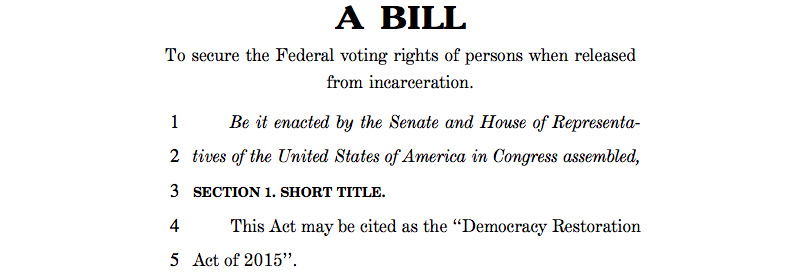The Democracy Restoration Act (DRA) is a bill that if passed would restore voting rights to 5.85 million released from prison or on probation.
The first attempt at passing the Democracy Restoration Act was in 2008, since then annual attempts have been made at passing the legislation.
The 2015 Act was introduced by Sen. Ben Cardin (D-MD) as S.772 on 03/18/15. Rep. John Conyers, Jr. (D-MI) introduced the House, H.R.1459, the following day.
Democracy Restoration Act Facts
Below are a number of facts on the Democracy Restoration Act and the Americans affected by it. All facts come directly from the bill itself, learn more at the Brennan Center for Justice.
- The Democracy Restoration Act of 2015, introduced by Rep. John Conyers (D-Mich.), would allow former inmates the right to vote in elections for federal office.
- Currently about 5.85 million Americans are unable to vote due to being incarcerated in the past.
- About 75% or 4.4 million are finished serving their sentences reside in the communities while on probation or parole or after having completed their sentences.
- About 2.6 million who have completed their sentences remain unable to vote due to state laws.
- 15 states and the District of Columbia already restore voting rights upon release from prison.
- 35 states continue to restrict the voting rights of people who are no longer incarcerated.
If the bill becomes law, the Democracy Restoration Act Would:
- Restore the rights of voters who are done serving their sentence.
- Ensure that American citizens on probation will never lose their right to vote in federal elections.
- Notify people about their right to vote in federal elections when they are leaving prison, sentenced to probation, or convicted of a misdemeanor.
- Eliminate the opportunity for erroneous purges of eligible citizens from the voting rolls and relieves confusion among election officials and the public about who is eligible to vote.
- Allow people to vote after incarceration encourages participation in civic life and helps rebuild ties to the community that motivate law-abiding behavior.
- Help to put an end to restrictive voting laws that disproportionally affect African-Americans.
- Nationwide 2 million African-Americans are unable to vote due to past incarceration. Given current rates of incarceration, approximately 1 in 3 of the next generation of African-American men will be disenfranchised at some point during their lifetime
- If current incarceration trends hold, 17 percent of Latino men will be incarcerated during their lifetimes, in contrast to less than 6 percent of non-Latino White men.
Read the bill: The Democracy Restoration Act (DRA)
